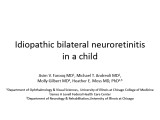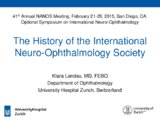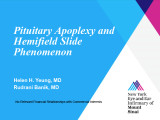Collection of materials relating to neuro-ophthalmology as part of the Neuro-Ophthalmology Virtual Education Library.
NOVEL: https://novel.utah.edu/
TO
- NOVEL725
| Title | Creator | Description | Subject | ||
|---|---|---|---|---|---|
| 251 |
 |
Idiopathic Bilateral Neuroretinitis in a Child | Asim V. Farooq, MD; Michael T. Andreoli, MD; Molly Gilbert, MD; Heather E. Moss, MD | PPT case describing idiopathic bilateral neuroretinitis in a child. | Neuroretinitis; Pediatric; Idiopathic; Optic Atrophy |
| 252 |
 |
The History of the International Neuro-Ophthalmology Society | Klara Landau, MD, FEBO | This presentation provides an ovreview of hte hisotry of the International Neuro-ophthalmology Society (INOS), with maps and photos. | International Neuro-Ophthalmology Society: INOS |
| 253 |
 |
Palinopsia: Some Visions Never Fade | Amrita-Amanda D. Lakraj, MD; Ryan D. Walsh, MD | This is a PowerPoint presentation, which teaches the symptom of palinopsia through a video of a patient's chief complaint in which he describes the symptom almost according to a textbook. This video is followed by a brief explanation of the etiology, management, and importance of diagnosing this sym... | Palinopsia; Visual Disturbance; Ghosting |
| 254 |
 |
Pituitary Apoplexy and Hemifield Slide Phenomenon | Helen H. Yeung, MD; Rudrani Banik, MD | PowerPoint of case presentation of pituitary apoplexy. Patient presented with bilateral severe visual loss and bilateral ophthalmoplegia from partial third nerve palsies (pupil-sparing with no ptosis) from midbrain compression. After transsphenoidal surgery with decompression of mass and steroids, ... | Pituitary Apoplexy; Hemifield Slide; Bitemporal Defect; Partial Third Nerve Palsy |
| 255 |
 |
Wallenberg Syndrome and Skew Deviation | Lauren Schneider, MD; Rudrani Banik, MD | Power point of case presentation of acute Wallenberg Syndrome associated with vertical diplopia, found by 3 step and supine testing to be consistent with skew deviation. | Wallenberg Syndrome; Skew Deviation; Vertical Diplopia |
| 256 |
 |
Retinal Causes of a Neurologic-Type Visual Field Defect | Omar Ozgur, MD; Rudrani Banik, MD | Power point of case presentation of 47 year old female with history of breast cancer with new onset temporal visual field defect and photopsias. Differential diagnosis of homonymous hemianopia discussed; retinal causes of neurologic-type visual field defects reviewed including: white dot syndrome (m... | Homonymous Hemianopia; Neurologic Visual Field Defect; Temporal Visual Field Defect; White Dot Syndrome; Multiple Evanescent White Dot Syndrome (MEWDS); Cancer-Associated Retinopathy; Tamoxifen Retinopathy; Autoimmune Retinopathy |
| 257 |
 |
Pseudotumor cerebri and Chiari Malformation | Nicole Scripsema, MD; Rudrani Banik, MD | Power point of case presentation of pseudotumor cerebri with co-existing Chiari malformation. Management of severe visual loss associated with chronic papilledema discussed, as well as possible relationship between raised intracranial pressure from pseudotumor cerebri and Chiari malformation. | Pseudotumor Cerebri; Papilledema; Chiari Malformation |
| 258 |
 |
Lemierre Syndrome - A Neuroophthalmological Approach | Vinzenz A. C. Vadasz, MD; Christina Gerth-Kahlert, MD | Case report of a twenty-two year old woman with double vision after tonsillitis, caused through multiples thrombosis by an infection with fusobacterium necrophorum known as the Lemierre-Syndrome. Fig. 1: Ocular motility at ICU (lying position) Fig. 2: white arrows show thrombosis of the right opht... | Lemierre-Syndrome; Fusobacterium Necrophorum; Septic Thrombosis |
| 259 |
 |
Cone Dystrophy | Gregory P. Van Stavern, MD | PowerPoint discussing Cone Dystrophy: Early loss of central and color vision; Color impairment often out of proportion to loss of VA; Hemeralopia ("day blindness") prominent; Light sensitivity and photophobia; Macular changes variable, and may occur late- may "Bull's Eye" pattern; Abnormal Photost... | Cone Dystrophy; Occult Macular Dystrophy; Central Cone Dystrophy |
| 260 |
 |
Pupillary Light Reflex | Wade Crow, MD | Illustration of the Pupillary Light Reflex. | Pupillary Light Reflex |
| 261 |
 |
Aberrant Regeneration of Third Nerve | Gregory P. Van Stavern, MD | 48 year old woman S/P rupture and repair of right sided posterior communicating artery aneurysm Video shows residual partial right third nerve palsy, with aberrant regeneration, causing a pseudo Von Graefe's sign (elevation of the right upper eyelid with attempted infraduction of the right eye) Se... | Aberrant Regeneration of Third Nerve; Third Nerve Palsy |
| 262 |
 |
Acute Retinal Necrosis (ARN) | Gregory P. Van Stavern, MD | Acute Retinal Necrosis causes inflammation and subsequent retinal detachment. This powerpoint provides images depicting ARN. | Acute Retinal Necrosis (ARN) |
| 263 |
 |
Congenital and Secondary Syphilis | Gregory P. Van Stavern, MD | Images showing evideince of Congenital and Secondary Syphilis | Syphilis |
| 264 |
 |
Vision & Alzheimer's Disease | Victoria S. Pelak, MD | Alzheimer's Disease (AD) is an age-related neurodegenerative disorder with progressive loss of cognitive function over time. A clinical diagnosis for Probable AD Dementia requires the following: a loss of cognitive function in two or more cognitive domains (or in one cognitive domain along with a ch... | Vision; Alzheimer's Disease |
| 265 |
 |
White Dot Syndromes: MEWDS, AZOOR, AIBSE | Gregory P. Van Stavern, MD | Some have lumped Multiple Evanescent White Dot Syndrome (MEWDS), Acute Idiopathic Blind Spot Enlargement (AIBSE) with acute macular neuroretinopathy, and pseudo-presumed ocular histoplasmosis syndrome together with AZOOR (Acute Zonal Occult Outer Retinopathy). These conditions all present with visua... | White Dot Syndromes: MEWDS, AZOOR, AIBSE |
| 266 |
 |
Superonasal Transconjunctival Optic Nerve Sheath Decompression: A Modified Surgical Technique Without Extraocular Muscle Disinsertion | Kevin E. Lai, MD; Kenneth C. Lao, MD; Peter L. Hildebrand, MD; Bradley K. Farris, MD | Report on the surgical technique and outcomes of a modified medial transconjunctival approach to optic nerve sheath decompression (ONSD) in 15 patients. Supplemental Digital Content : Video that demonstrates the stONSD procedure. m4v: http://content.lib.utah.edu/cdm/ref/collection/EHSL-NOVEL/id/22... | Superonasal Transconjunctival Optic Nerve Sheath Decompression (ONSD); Surgical Technique |
| 267 |
 |
Disability Evaluation Under Social Security | John Pula, MD | A. How do we evaluate visual disorders? 1. What are visual disorders? Visual disorders are abnormalities of the eye, the optic nerve, the optic tracts, or the brain that may cause a loss of visual acuity or visual fields. A loss of visual acuity limits your ability to distinguish detail, read, or do... | Visual Impairment; Visual Disorders; Legal Blindness |
| 268 |
 |
Retinitis Pigmentosa - Rod Dystrophy | Gregory P. Van Stavern, MD | PowerPoint discussing retinitis pigmentosa, rod dystrophy. Retinitis Pigmentosa is a generalized retinal dystrophy with peripheral rather than central onset Primarily rod-cone dystrophy. Provides images. | Rod Dystrophy; Rod Dystrophy; Retinitis Pigmentosa; Night Dlindness |
| 269 |
 |
Tonic Pupil | Adesina, Ore-Ofe, MD | PowerPoint presentation covering tonic pupil, which is damage to ciliary ganglion or short posterior ciliary nerves. It causes denervation of the ciliary body and iris sphincter muscle. | Tonic Pupil |
| 270 |
 |
Horner's Carotid Dissection | Gregory P. Van Stavern, MD | PowerPoint describing Horner's Syndrome and Carotid Dissection. | Horner's Syndrome; Carotid Dissection; Dark Adaptation; Rod Dystrophy |
| 271 |
 |
Acute Multifocal Pigment Epithelium Epitheliopathy (AMPEE) | Gregory P. Van Stavern, MD | Images providing example of Acute Multifocal Pigment Epithelium Epitheliopathy (AMPEE) | Acute Multifocal Pigment Epithelium Epitheliopathy (AMPEE) |
| 272 |
 |
Histoplasmosis | Gregory P. Van Stavern, MD | Histoplasmosis, a fungus, can present acutely as a systemic condition. This image shows signs of Histoplasmosis. | Histoplasmosis |
| 273 |
 |
Multifocal Choroiditis | Gregory P. Van Stavern, MD | Multi-focal choroiditis is usually a bilateral choroidopathy seen more frequently in women associated with punched out appearing lesions occasionally with pigment around the edges. Image provides example. | Multi-Focal Choroiditis Panuveitis |
| 274 |
 |
Retinitis Pigmentosa | Gregory P. Van Stavern, MD | Retinitis pigmentosa is a retinal/choroidal degeneration caused by various genetic defects. The term retinitis pigmentosa is really a misnomer since it is not inflammation (retinitis) and it is not a disease of the pigmentary system (pigmentosa). | Retinitis Pigmentosa |
| 275 |
 |
Serpiginous Choroidopathy | Gregory P. Van Stavern, MD | Serpiginous choroidopathy (also known as Geographic choroidopathy) usually affects the choroid, the choriocapillaris and the retinal pigment epithelium in both eyes. | Serpiginous Choroidopathy |
